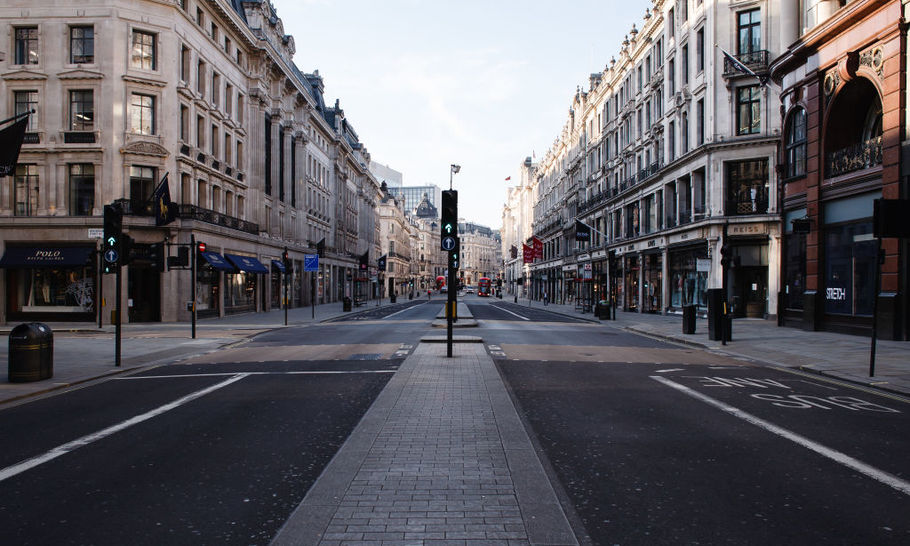London is dying. Boris Johnson must make its revival his personal mission

(Photo by David Cliff/NurPhoto via Getty Images)
London is still a ghost town. Anybody who has visited the capital in recent weeks will recognise the truth of what the Governor of the Bank of England told a gathering of the Conservative 1922 Committee. Andrew Bailey told MPs that during his daily commute to the City for the past 17 weeks he had noticed little sign of activity. The “big problem” for employers was how to encourage staff to return to their offices, rather than work from home.
For without the daily influx of these office workers, the prospects for London’s economy are bleak. The shops and restaurants, sandwich bars and pubs that commuters patronise are mostly still closed. Those that have reopened are running at a loss. The City is the beating heart of the financial services industry, which employs more people than any other in Britain. A gaping hole in that heart could be fatal — not only for bankers and brokers, but for the entire infrastructure that sustains them and is sustained by them.
Nor is the problem confined to the City of London. Walking around South Kensington this week, the visitor cannot help but be struck by its emptiness. There are no Imperial College students or academics, no children in the museums, and above all no tourists. In a normal year, London plays host to ten million foreign visitors. It is one of the most popular destinations on the planet. Without this annual influx of customers, the capital’s hospitality industry cannot turn a profit. Without their student population of 400,000, its 40 universities cannot survive.
London’s unique and precious culture is on life-support. Institutions such as the British Museum and Tate Modern normally attract more than five million visitors per annum. About 12 million attend plays, musicals, concerts and other shows in the West End, the South Bank and other venues. The museums and galleries are gradually reopening, but the theatres and concert halls will take much longer. These are the magnets that draw countless visitors to London. Covid-19 has meant that they are not attracted, but repulsed.
Our greatest living playwright, Sir Tom Stoppard, has been telling friends that he sometimes despairs of ever seeing a play again in the West End. His own latest offering, Leopoldstadt, had just opened when the pandemic struck. Now the theatres are dark. Watching live performances on a screen is just not the same experience as being there. The injection of up to £1.8 billion of public funds into the arts is welcome, but is dwarfed by England’s annual revenue from tourism of more than £100 billion, much of it spent in London. Not just individuals, companies and buildings, but the art forms themselves are now threatened. Time is running out to rescue them from extinction.
The Government is gradually changing its advice. People are now to be told that they should no longer avoid public transport, but use it. Wearing masks may be tiresome and take a while to become habitual, but the practice gives people the confidence to travel and enter enclosed public spaces. It is also, as Michael Gove points out, just good manners — something on which we British have always prided ourselves.
London’s plight is not quite as dire as that of New York City. A census there has revealed that at the height of the pandemic, up to half of the population simply fled — and most have not returned. Such a panic reaction was not unknown here, but it has been untypical. Perhaps the Blitz spirit survives. Londoners don’t take to the hills; they just keep clam and carry on. But Londoners alone cannot keep London going. There are just not enough of them. The capital we have come to know and love depends on the rest of the country — and the world — to give of its best.
This symbiotic relationship is a matter, not merely of civic but of national importance. The former Mayor of London who now occupies 10 Downing Street needs to get out more and look about himself. The city that has stood for nearly 2,000 years — and has been the greatest on earth for at least the last 200 — will require intensive care if it is not to be killed by coronavirus. Our capital cannot be allowed to wither before our eyes. Boris Johnson must make it his personal mission to make sure that London lives again.





